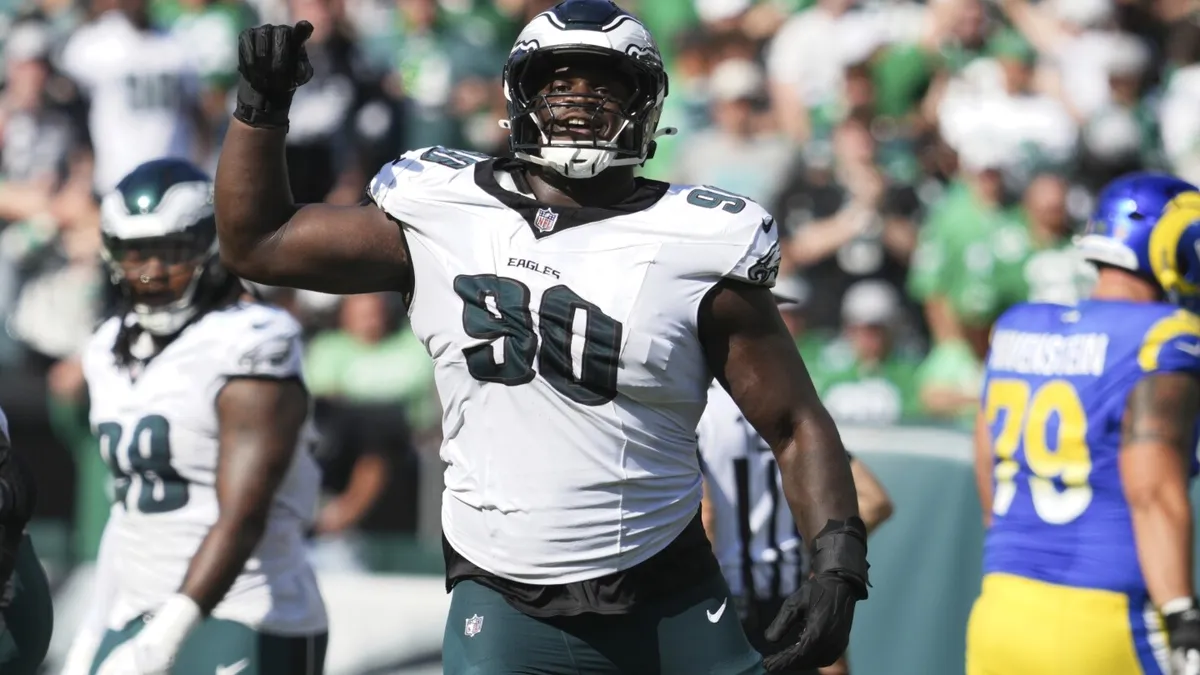
The recent legalization and normalization of sports betting have transformed once minor details into major headlines. This shift, for better or worse, was vividly illustrated in a recent NFL game featuring the Philadelphia Eagles and the Los Angeles Rams. On a dramatic Sunday, the spotlight shone on Eagles defensive tackle Jordan Davis, who blocked a last-second field goal attempt by the Rams. This critical play preserved the Eagles' astonishing comeback, as they turned a daunting 26-7 third-quarter deficit into a remarkable 20-point run, ultimately winning 33-26.
In a moment that captured both the excitement of the game and the implications of sports betting, Davis not only blocked the field goal but also scooped up the loose ball and charged 61 yards for a touchdown. This unexpected turn of events not only sealed the victory for the Eagles but also ensured they covered the spread, a detail that resonated with bettors across the nation. The conventional wisdom might suggest that the best football strategy would have been for Davis to simply fall on the ball and secure the win, thus avoiding any risk of a turnover that could have led to a Rams game-winning score.
Had a Rams player managed to tackle Davis, the ball could have been dislodged, potentially allowing for a game-changing return. Even if the Rams were stopped during the return, a penalty against the Eagles—such as a facemask—could have granted the Rams an untimed down and another chance at a game-winning field goal. However, in the heat of the moment, Davis’s instinct drove him to make an impressive run, highlighting how the thrill of the game can influence decision-making.
This play serves as a striking illustration of how the landscape of professional sports is shifting due to legalized sports betting. The focus has expanded beyond just winning and losing for teams; it now includes the financial stakes involved for countless fans and bettors. For some, the exhilaration of a financial victory is intoxicating, while others experience the heartache of a bad beat. This duality underscores the reality that a single moment in a game can have far-reaching financial consequences.
While nothing about Davis's play indicates a need for immediate oversight or regulation, it highlights the unpredictable nature of sports—where one player's spontaneous decision can impact millions of dollars. Moreover, it serves as a reminder of the potential for an NFL gambling scandal, which could arise from players or coaches attempting to manipulate outcomes for personal gain. Although the league has thus far managed to avoid such controversies, it is crucial to acknowledge that the increasing prevalence of betting commercials and the normalization of gambling may influence the next generation of players.
As more young athletes enter the league, many will have grown up in an environment saturated with betting advertisements. Their perspective on gambling will likely differ significantly from that of previous generations, blurring the lines between competitive sport and financial stakes. The competitive thrill of sports may increasingly intertwine with the excitement of betting apps on their phones, fundamentally changing the way athletes and fans engage with the game.
In conclusion, the intersection of sports and betting is more than just a fleeting trend; it is reshaping how fans and players perceive the game. As the NFL continues to navigate this evolving landscape, the implications of legalized sports betting will undoubtedly remain at the forefront of discussions about the integrity and future of professional football.